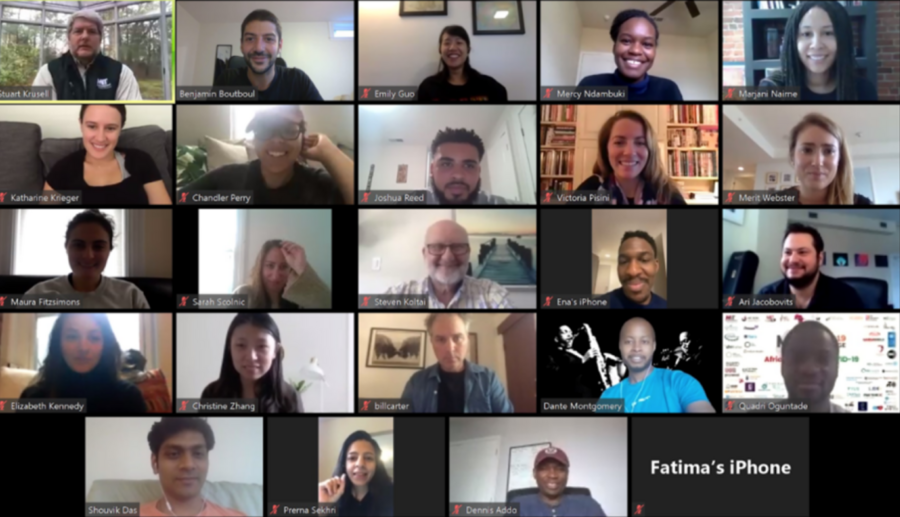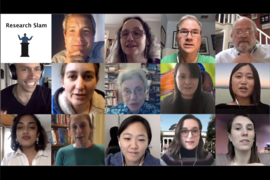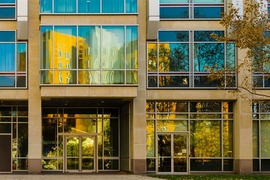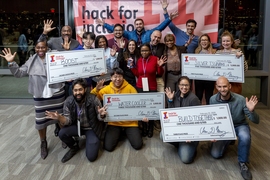It all started, like so many things recently, with a Zoom call.
David Capodilupo, assistant dean for MIT Sloan Global Programs (GP); Bill Carter, award-winning filmmaker, author, teacher, and MIT consultant; and Stu Krusell, senior director at GP, were discussing what they could do to support the fight against Covid-19 in Africa. The need was immense. They talked about leveraging the vast network and resources of MIT to help those on the ground in Africa fighting the virus. The question was: How do you bring lots of people together to address this problem? The answer they decided on: a virtual hackathon.
The next step was finding partners. The logical starting point was the organizers of the Africa Innovate Conference (AIC) that had to be canceled due to Covid-19 restrictions. MBA students Benjamin Boutboul, AIC co-chair, who had recently participated in the MIT Covid19 Challenge Beat the Pandemic, a large virtual hackathon held just a few weeks earlier, and Bryan Fondufe, AIC sponsorship lead, jumped at the opportunity to channel the conference team and energy into the MIT-Africa Takes On Covid-19 hackathon.
This small team connected with the leaders of the MIT Covid19 Challenge: Freddy Nguyen, MIT postdoc and resident at Mount Sinai Hospital; MBA student Alfonso Martinez; Paul Cheek of the MIT Trust Center; and Ari Jacobovits, All Africa managing director with the MIT International Science and Technology Initiatives (MISTI). This was the key that made it possible to commit to hosting the hackathon two weeks out.
Boutboul took the lead in forming a dedicated group of about 40 students who collectively volunteered hundreds of hours to recruit participants and mentors, define problem statements, create Slack channels and Zoom calls, and plan the detailed, complex logistics needed to pull off a global hackathon in less than two weeks.
The core team also reached out and engaged more than 70 partners who would help with publicity, serve as mentors/judges, and, most importantly, commit to be part of the implementation post-hack so the event would be about action, not just idea generation. This included 15 different MIT-based research centers and programs, with prize sponsorship from MIT Sloan Global Programs, MIT REAP, Legatum Center, MISTI, MIT Corporate Innovation Program, and MIT GOV/LAB. They were joined by a diverse group of more than 50 external partners including the Clinton Foundation, ONE, Partners in Health, BIO Ventures for Global Health (BVGH), Global Partnership for Sustainable Development Data, Beth Israel Deaconess Medical Center, the United Nations Development Programme, Northern Arizona University, and Waze.
Importantly, the team leveraged the strong network of MIT alumni active in Africa, including, but not limited to, Claude Grunitzky MBA ’12 of True Africa; Aminata Kane MBA ’13, CEO of Orange Sierra Leone; and David Moinina Sengeh SM ’12, PhD ’16, Sierra Leone’s minister of basic and senior secondary education, who gave one of the keynote addresses during the event kickoff.
A central task was identifying the critical challenges the teams would be working to find solutions for. The team targeted 10 tracks — six under Strengthening the Health System, and four under Flattening the Curve.
The result: 1,250 participants (50 percent from Africa) representing 106 countries (44 in Africa), 174 teams, 200-plus mentors, 70-plus partners, 40 judges, and 30 winning teams.
Hundreds of comments were posted in the Slack workspace and emailed to organizers after the weekend, noting the success of the community effort and, crucially, looking how to quickly move to sustainable solutions post-hack.
"Thanks so much for the good work," said Tom Rogers Muyunga-Mukasa, physician with Advocacy Network Africa. "I am starting two projects out of this. One is in Uganda and it is around strategic public health, wellness, and quality life advocacy targeting marginalized to improve participation in health-promoting activities. The other is in Kenya, and it is around community organizing to end TB, HIV, and malaria, integrating Covid-19."
Aryaana Khan, a student at the City College of New York, said, "We're all so inspired by everyone's ideas and hard work this weekend; please reach out to us if you ever want to collaborate or discuss initiatives!"
Anjali Vardhan, founder and CEO of Virtabot, said, "This was truly a remarkable and humbling experience. I’ve learned so much and made some new friends from around the world. These journeys always remind of the quote by Mattie Stepanek — 'Unity is strength … when there is teamwork and collaboration, wonderful things can be achieved.' This is such a great platform to share innovative platform."
"It was a marvel to be watch the challenge unfold over the weekend, with so many viable and well-thought-out solutions to the pandemic’s impact in Africa," added Kendal Makgamathe, head of brand and business development in the Tshimologong Digital Innovation Precinct at Wits University. "The sheer enthusiasm and commitment from all involved was inspirational. Thank you for the invitation."
Oluseun Onigbinde, founder of BudgIT, said, "I was amazed at the brilliant ideas that are capable of stemming the spread of the pandemic and also improving the capacity of public institutions and citizens to intervene. I was impressed that participants were not hesitant in intersecting emerging technologies with the realities of the African environment. I look forward to an incredible execution of the sound ideas, backed by the sheer determination of Africans."
In seeing his efforts come to fruitiion, Boutboul was highly enthusiastic with the results. "What. An. Experience," he said. "These past two weeks feel like a blur but I am so proud of us and what we all accomplished together. This was definitely one of the highlights of my MBA and I am SO happy to have shared this with you all."
Added Jacobovits, "I’ve really just loved seeing all the major institutional support from everyone that showcased how MIT is building up its Africa engagements. The African Innovation Conference team was especially inspiring."









